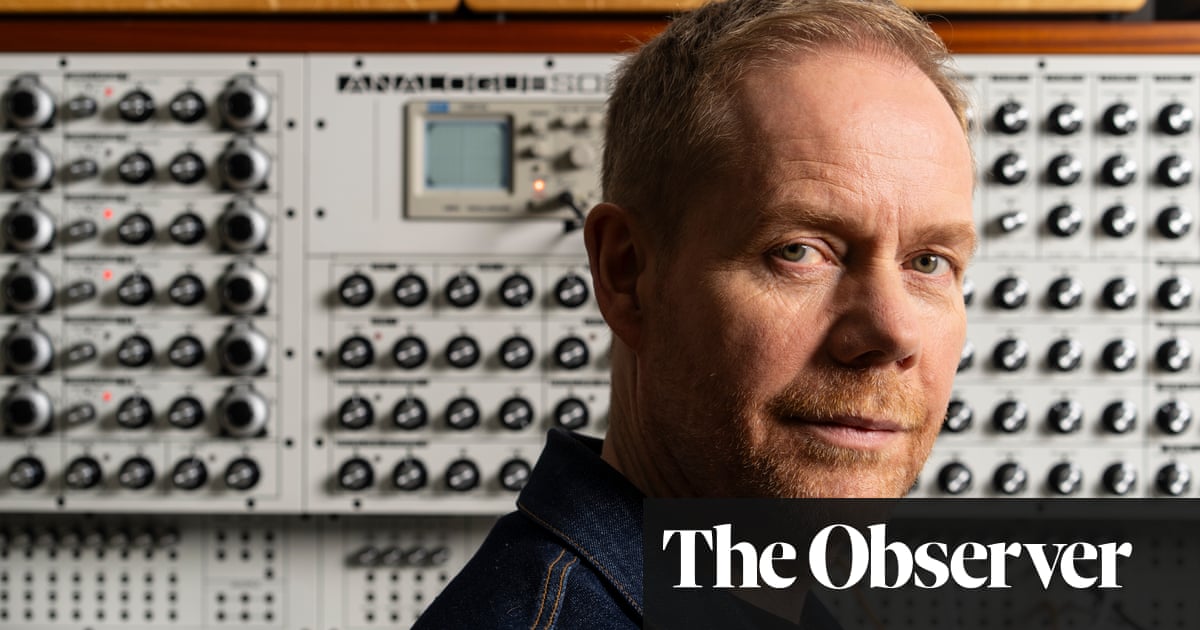Born in 1966 in Lower Saxony and brought up in Bedford, Max Richter is an award-winning classical composer. Working across live performance, film, dance, art and fashion, he has released nine solo albums, including 2015âs Sleep, an eight-and-a-half-hour work based on the neuroscience of sleeping; 2020âs Voices, inspired by the Universal Declaration of Human Rights; and In a Landscape, released last month. A new ballet, MaddAddam, a collaboration between Richter and choreographer Wayne McGregor, with Margaret Atwood as a creative consultant, opens at the Royal Opera House on 14 November.
Youâve got a busy autumn ahead. Tell us about In a Landscape first â a more intimate, personal album for you.
It is. Itâs an album about polarities, which are all around us in the world, and how we can reconcile them. We live in a time where one of the biggest challenges is that people who have different opinions basically canât talk to one another any more. This record is a small appeal to try to harmonise these differences, by working with materials that we might think of as in opposition â found sounds and composed music, the human world and the natural world â trying to put these things together in a fruitful relationship.
What extremes do you come across in your day-to-day life?
So much of our media consumption now is driven algorithmically, which is very difficult to avoid. Algorithms are essentially driven by cortisol and dopamine spikes. You know, the more rage, the more clicks. Plus the online space is essentially an advertising space, so this dynamic is everywhere. Weâre all surfing on this wave that is mediated by extreme emotions.
How do we resist that?
Everyone needs to develop their own strategies, whether thatâs taking time out using systems to mute various apps, or leaving your phone at home, or changing your habits. Itâs particularly challenging for parents whose kids have grown up with this environment all around them, where DM-ing one another on a platform is the norm. Youâve just got to encourage the idea that every interaction doesnât have to be online.
Sleep was your âpersonal lullaby for a frenetic world â a manifesto for a slower pace of existenceâ. Itâs now the most streamed classical music album of all time. How does streaming sit with you as an artist?
Sleep is 10 years old next year, unbelievably, so weâre going to play some more concerts around it, and doing the concerts is great. As for streaming, the fact that people can explore the musical universe simply by following their affections and curiosity is amazing. As a kid, if I wanted to hear a piece of music I didnât know, I had to take a risk â make that bus trip, go either to the record library or the shop. Now, of course, itâs just a click. But the economics of streaming are very problematic. Itâs put huge pressure on artists in terms of making a living.
Youâve talked before about loving musicians such as techno DJ Jeff Mills and Radioheadâs Jonny Greenwood working in the classical field. Who else should we listen to?
Sufjan Stevensâs Reflections [from 2023], ballet music written for two pianos, played by Timo Andres and Conor Hanick, is absolutely beautiful. Then again, heâs always been a really interesting artist. [Caribbean-Belgian jazz musician] Nala Sinephroâs new album is great too. She was an artist in residence at our studio a little while ago, so it was brilliant to hear the record sheâs made.
Youâre also a fan of Chic and played with the Future Sound of London. Are you a secret raver?
Iâm a low-key raver! You know, I got into composing music because I love all kinds of music. With Chic, there are so many things about their work that I love. A lot of their songs sound like mantras, full of a rhythmic sort of repetitiveness, which really ties into systems music for me [like the work of Steve Reich and Philip Glass]. Itâs also amazingly well played and produced.
I also understand you love Eurovision. Why?
Itâs just a perfect evening of craziness, isnât it? You suspend all notions of genre and taste and it all just kind of⦠happens. I genuinely love it. Itâs multidimensional â you get to experience all sorts of national identities through the music, and ideas of whatâs cool in different places, which can be hilarious.
Whatâs your favourite Eurovision song of all time?
[Abbaâs] Waterloo, obviously. Itâs a towering masterpiece. Recently, Iâm more struck by the staging, like the man playing the grand piano on fire [in the Austrian entry in 2015], plus the guy in that ginormous hamster wheel [in Ukraineâs 2014 entry, Tick-Tock] was a bit of a classic.
Whatâs it like working with Margaret Atwood?
She was fairly hands-off because we were working with a text that had already existed [her 2013 novel of the same name], but we did have breakfast together, where she told us lots of things about how it was going to be. After that, she basically left Wayne and me alone. We were passing ideas back and forth the whole time â what about this? And what about that? Sometimes it lands very fast, sometimes it takes a bit of time. Itâs like ping pong.
Can music have a political impact?
It depends on what we mean by politics. Or let me put it this way: I think music can sort of shift our state of mind, to take us into another mental space separate from the world of the day-to-day. It also gives us evidence about how someone else felt â what it felt like to be them â which is one of the most important things in the social and political sphere. Experiencing somebody elseâs perspective, and what feelings might be behind that, is really valuable.
-
MaddAddam is at the Royal Opera House, London WC2, 14-30 November

